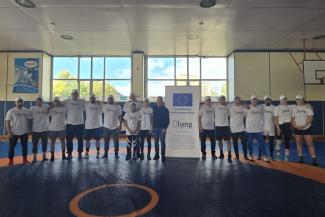A Day in the Life of Olympic champion Jordan Burroughs
Wednesday, January 11, 2023 - 11:24 By Eric Olanowski
PHILADELPHIA, United States (January 11) --- Jordan BURROUGHS (USA) gave us a rare glimpse into what a day in his life looks like chasing a second Olympic title while being a father of four, husband and six-time world champion.
Burroughs started his day by waking up at 5:45 am. At 6:00 am, he made his way down to his gym, conveniently located a few floors below his apartment, for an ISO-movement/functional mobility workout with Conor Millstein.
After his hour-long morning workout, Burroughs took a little more than an hour to himself, showering and answering business emails, before his four kids and wife woke up.
At 9:00 am, Burroughs went down to the lobby of his high rise to grab his groceries before sitting down for his favorite meal of the day, breakfast, with his wife, Lauren, and four kids, Beacon, Ora, Rise and Banner.
Following breakfast, Burroughs sat down at the family kitchen table for bible study and a Spanish lesson with his two oldest kids, Beacon and Ora.
Around 10:30 am, Burroughs packed his bags for practice and turned his kids over to Lauren. Then, he drove 20 minutes to the Pennsylvania Region Training Center, where he practiced from 11:00 am - 1:00 pm.
Once practice was in the rearview, Burroughs made his way to Vibes Barbershop for a 2:00 pm haircut with his barber, @crafty.lou.
After getting a fresh cut at Vibes Barbershop, Burroughs went home to prepare for the Pennsylvania Regional Training Center's Evening Of Celebration, a night to celebrate Jordan winning his sixth world title and the successes of his fellow PRTC athletes.
Burroughs arrived at the Evening Of Celebration dinner at 17:10. He spent an hour mingling with guests and friends before wrapping up his 15-hour day with a speech.


Share your thoughts.
Comments